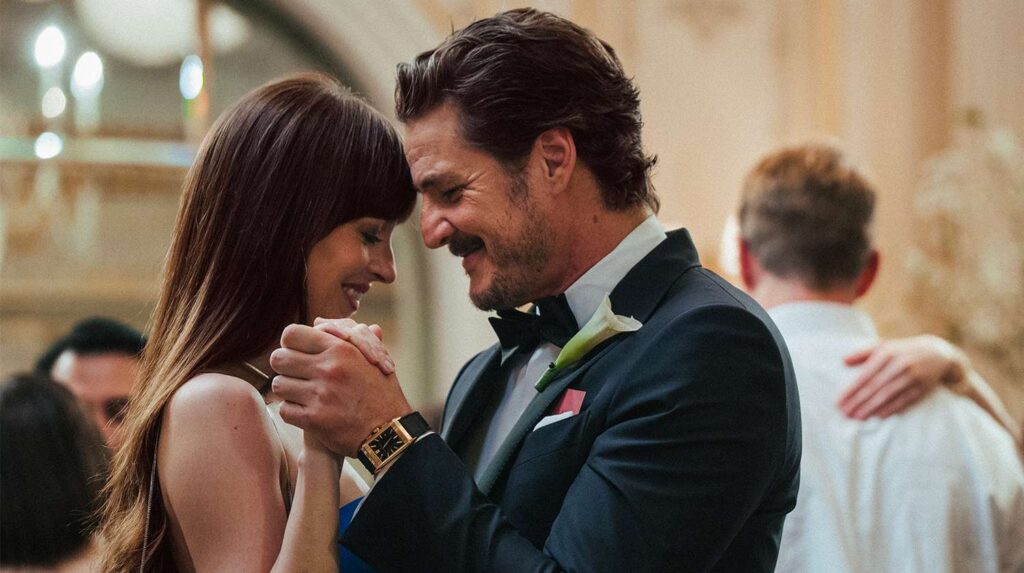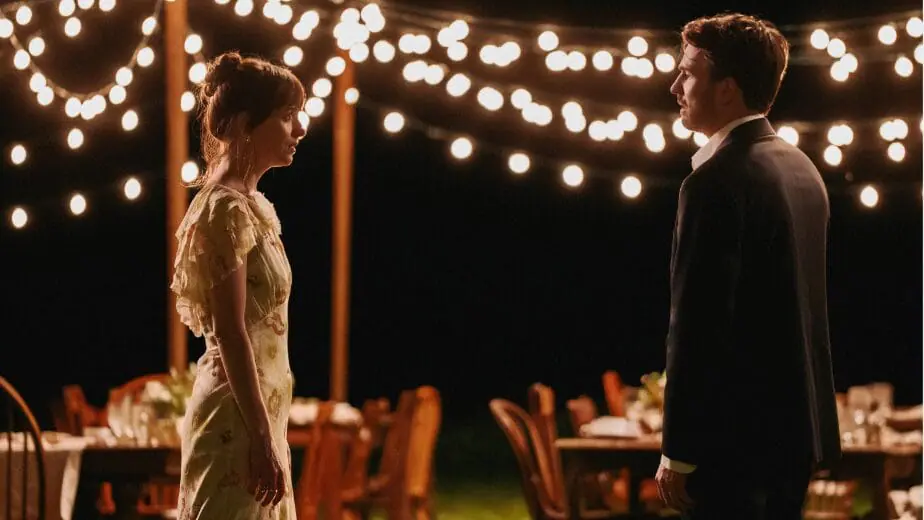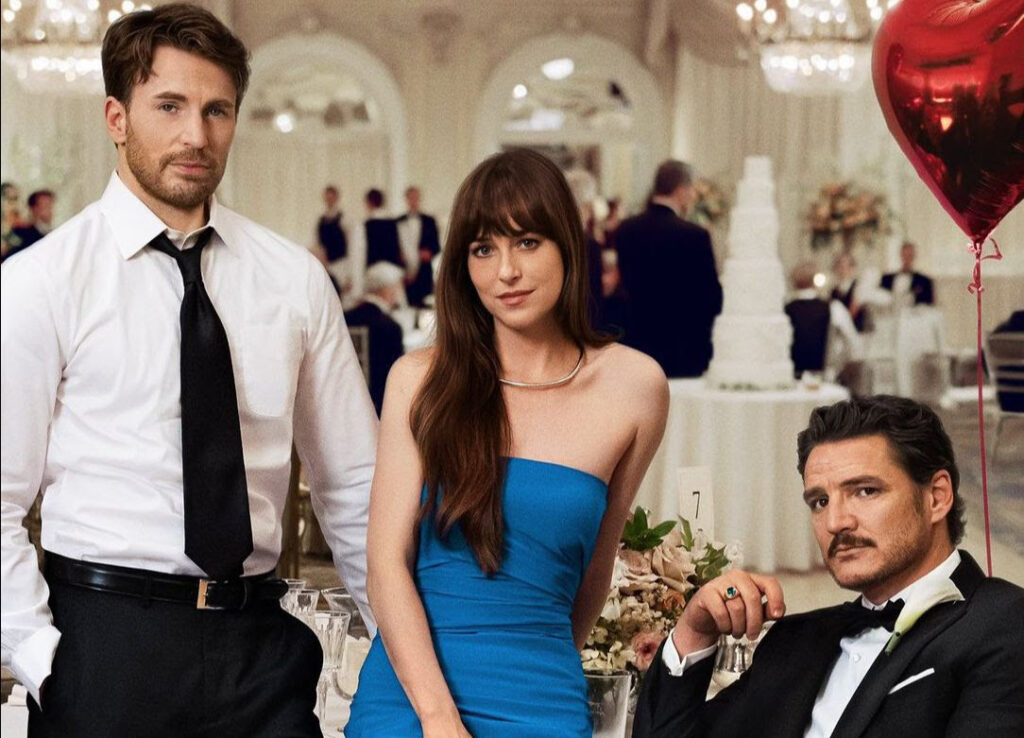Celine Song’s “Materialists” is a romantic not-comedy so entrancing, honest, and heartfelt that nothing could ruin it—not even being ordered to out yourself as single in a sold-out movie theater.
I wish I were speaking hypothetically, but believe it or not, the host of the screening I attended asked all unattached attendees to raise their hands. Apparently, she fancied herself a matchmaker, like the film’s suave antiheroine, Lucy (Dakota Johnson).
“I’m not going to self-identify,” I snarled quietly. Why proudly thrust a palm in the air? Like being married, being single isn’t inherently empowering or confining. It is simply a reality, playing its part in the story of who you are and how you live.
That reality seeps into every scene in “Materialists,” which evokes the existential drudgery of the dating-industrial complex: match, date, despair, and weigh the indignities of the journey against the uncertainty of the destination.
“Why does anyone even get married?” wonders John (Chris Evans), Lucy’s ex-boyfriend. “Because they’re lonely,” Lucy replies. “And because they’re hopeful.” You’ve got pragmatism.
A screen poet of isolation and optimism, Song first directed “Past Lives” (2023), about two childhood sweethearts from Seoul who reunite as adults in New York—an intertwining of souls and skylines all the more exquisite because of its transience.
As elongated as “Past Lives” was ephemeral, “Materialists” begins by settling in for the long haul—specifically, the 100,000-year haul, complete with a prologue chronicling the marriage of two cavepeople. “Love is easy,” Lucy insists, and in the opening scene, it certainly seems so. All a caveman has to do to tie the knot is smile and wrap a flower stem around his beloved’s finger, propelled by pure romantic instinct.
A few millennia later, instinct has shriveled into computation. As a star matchmaker at a New York company called Adore, Lucy studies her clients’ desires, striving to build marriages based on the hairline, salary, or skin color they happen to prefer.
“If there’s no specialty appeal, there’s no appeal in any market,” Lucy says flatly. She sells a mirage of true love, but she also sells people like Sophie (Zoë Winters), a traumatized and humiliated client who sees Lucy late in the film and shouts, “Pimp!”

Lucy fluently speaks the language of romantic destiny (she wants to find you a “nursing-home partner” and a “grave buddy”), but her floridity is belied by her favorite excuse when a date ends with a dumping: “He checked a lot of our boxes.”
That mantra betrays the calculation that Lucy applies not only to the courtship of her clients, but to suitors like Harry (Pedro Pascal), a private-equity investor who smoothly sizes her up at a wedding reception.
“I’m going to call you, but not to hire you,” Harry tells Lucy. His pronouncement has the ring of prophecy, but watch how he’s introduced: In a stately tracking shot that allows the 5’ 11” Pascal to dominate the frame, poignantly priming him to recede.
A more offhand image heralds the arrival of John, a sometime actor slumming for a catering company called Stand and Deliver. Working at the reception as a waiter, he first emerges in the background, looking so hazy and indistinct that you might ask, “Is that actually Chris Evans?”
It is, of course, but not the placidly heroic Evans of Marvel movies (or the voraciously evil Evans of “Scott Pilgrim vs. the World”). Instead, John is an insecure yearner who gets Lucy’s voicemail yet always takes her call, even as he frets that he’s being used.
“I’m usually desperate enough to let you,” John tells Lucy ruefully. Typically, only women in Hollywood romances are granted the grace of vulnerability, but Song offers a more expansive view of gender, building on a young man’s advice to a friend in “Past Lives”: “Cry hard.”
It takes two acts for tears to start flowing through “Materialists”—not because Song is stingy with emotion, but because all of her characters, whether they hire a matchmaker or not, have succumbed to the mechanized allure of Lucy’s curated brand of love.
“I’m on a date,” John’s character in a play announces, addressing the audience. A woman sits next to him, but she too is staring straight ahead, privileging the attention of many over the intention of one.
While that moment evokes the dating-app paradox (limitless possibility, minimal intimacy), Lucy, John, and Harry spend little time gazing at screens, an omission that telegraphs Song’s desire to bring her characters back to reality through exposure therapy.
It’s a cure that can be brutal, as Lucy discovers when Sophie, one of her least-favorite clients, was assaulted on a date that she arranged (in a feat of creepily counterintuitive casting, the attacker, heard only on the phone, is played by the warmly sincere John Magaro, another “Past Lives” veteran).
“If you do this long enough, it happens to all of us,” Lucy’s boss, Violet (Marin Ireland), says bluntly. So callous is her cynicism that it cracks Lucy’s seemingly shatterproof façade, awakening her darkest beliefs about her clients—and herself.
“They are children,” Lucy says disdainfully, despite fearing that she has even less to recommend her. After all, she was the one who spurned John because of his meager bank account, chiding him for being content to enjoy an anniversary dinner from a halal food cart.

“I’m awful,” Lucy tells John. I suspect some moviegoers will smugly nod in agreement, but is Lucy any more of a materialist than Elizabeth Bennet in “Pride and Prejudice,” who admitted that the “beautiful grounds at Pemberley” stoked the fires of her passion for Mr. Darcy?
Like Elizabeth, Lucy is privileged—she revels in the luxuries afforded by an $80,000 salary—but she believes that because she doesn’t come from money, she will never be fully accepted by men like Harry, who has the swagger of someone who enjoys $400 haircuts.
“[I’m] just a girl who works,” Lucy insists. Her lifestyle depends on that work, which begs the question: Does she love her consumer comforts enough to keep setting women up with men she describes as “morons” and “criminals,” in order to inflate her marriage count? (She’s brokered nine unions on behalf of Adore.)
A glimpse of a life beyond romantic box-checking and duplicitous love-packaging emerges near the end of “Materialists,” when Lucy and John drive out of the city and crash a wedding, slipping into a nighttime reception where candlelight illuminates his dark suit and her diaphanous dress.
“Are we getting back together?” John asks. I won’t spoil Lucy’s answer, but I will say that in its final scenes, “Materialists” becomes a story of rebirth—not only for Lucy and John, but for Lucy and Sophie, whose frayed bond is as impassioned and complex as any of the film’s love stories.
Having a boyfriend would be great, Sophie tells Lucy, because she’d have someone to turn to other than “my fucking matchmaker.” It’s the most romantic line in the film because it’s real, uniting two women who finally see each other clearly, through the gauze of disappointment and hurt.
Just as John Ford once introduced himself as a director of westerns, Song could introduce herself as a director of romances. Not only are her films romantic in style, but she illuminates romance almost everywhere: between men and women, matchmakers and clients, old love and new.
For all, love is an uneasy prospect. “I find it to be the most difficult thing in the world,” Harry says. Yet by the time “Materialists” ends—with a tender scene that slyly encompasses longings from across time—to love feels a little less difficult.




One Response